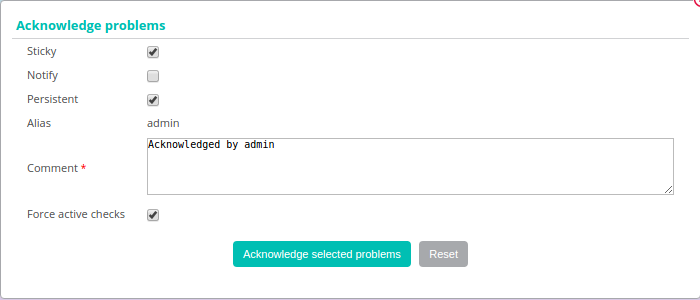Acknowledging an alert
Principle
When a host or a service has an incident and this incident is confirmed, the notification process is triggered. This can generate a notification sent to a contact. If the problem persists, and depending on the configuration produced (resend a notification at regular time intervals, escalation of notification, etc.), it is possible that other notifications will be sent.
The acknowledgment of an alert can be used to stop the notification process (sending of notifications) until the host or the service resumes its nominal status.
Example of use:
A service is in charge of checking the health of the hard disks in a disk array. A hard disk on a disk array goes down, and a notification is sent. The monitoring operator acknowledges the service, specifying that a team is in the process of dealing with the problem. Notifications are no longer sent. The service will return to its nominal state after a change of disk.
The acknowledgment of an alert means that a monitoring user has taken the problem into account - not that the incident has been corrected; this can only take effect when the check returns to its nominal state.
Practice
To acknowledge an alert, there are several solutions:
- From the Resources Status page
- From real time monitoring
- From the detailed sheet of an object
-
Go to Monitoring > Resources Status.
-
Use one of the following methods:
-
Select the object(s) that you want to acknowledge, then click the Acknowledge button above the list of resources.
-
Click on the resource to open its Detail panel and click the Acknowledge button below the tabs.
-
Hover over the resource you want to acknowledge, then click the Acknowledge icon that appears on the left.

A window appears:
-
The Comment field is generally used to provide the reason for the acknowledgment. It is mandatory.
-
If the Notify box is checked, a notification is sent to the contacts linked to the object to warn them that the incident on the resource has been acknowledged (if the contact possesses the activity acknowledgment notification filter).
-
If the Sticky box is checked, the acknowledgment will be maintained in case of a change of Not-OK status (e.g.: DOWN to UNREACHABLE or WARNING to CRITICAL). Otherwise, the acknowledgment disappears and the notification process is reactivated.
-
If, for a host, the Acknowledge services attached to host box is checked, acknowledging the alert on the host will acknowledge all services for this host automatically.
-
-
Go to Monitoring > Status Details > Hosts (or Services).
-
Select the object(s) that you want to acknowledge.
-
In the More actions menu, click Hosts: Acknowledge or Services: Acknowledge.
The following window appears:

- If the Sticky box is checked, the acknowledgment will be maintained in case of a change of Not-OK status (e.g.: DOWN to UNREACHABLE or WARNING to CRITICAL). Otherwise, the acknowledgment disappears and the notification process is reactivated.
- If the Notify box is checked, a notification is sent to the contacts linked to the object to warn them that the incident on the resource has been acknowledged (if the contact possesses the activity acknowledgment notification filter).
- If the Persistent box is checked, the acknowledgment will be maintained in the case of a restart of the scheduler. Otherwise, the acknowledgment disappears and the notification process is reactivated.
- The Comment field is generally used to provide the reason for the acknowledgment. It is mandatory.
- If the Acknowledge services attached to hosts box is checked, all the services linked to the host will be acknowledged (option visible only if we acknowledge a host).
- If the Force active checks box is checked, a command will be sent to the scheduler to recheck the resource as soon as possible.
From of the detail page of an object, click the icon |enabled| associated with the Acknowledged field in the Options frame.
The following window appears:

- If the Sticky box is checked, the acknowledgment will be maintained in case of a change of Not-OK status (e.g.: DOWN to UNREACHABLE or WARNING to CRITICAL). Otherwise, the acknowledgment disappears and the notification process is reactivated.
- If the Notify box is checked, a notification is sent to the contacts linked to the object to warn them that the incident on the resource has been acknowledged (if the contact possesses the activity acknowledgment notification filter).
- If the Persistent box is checked, the acknowledgment will be maintained in the case of a restart of the scheduler. Otherwise, the acknowledgment disappears and the notification process is reactivated.
- The Comment field is generally used to provide the reason for the acknowledgment. It is mandatory.
- If the Acknowledge services attached to hosts box is checked, all the services linked to the host will be acknowledged (option visible only if we acknowledge a host).
- If the Force active checks box is checked, a command will be sent to the scheduler to recheck the resource as soon as possible.
Disacknowledging resources
To delete the acknowledgment of an incident on an object:
- From the Resources Status page
- From real time monitoring
- Go to Monitoring > Resources Status.
- Select the objects you want to disacknowledge.
- In the More actions menu, click Disacknowledge.
- Go to Monitoring > Status Details > Hosts (or Services).
- Select the objects you want to disacknowledge.
- In the More actions menu, click Hosts: Disacknowledge or Services: Disacknowledge.